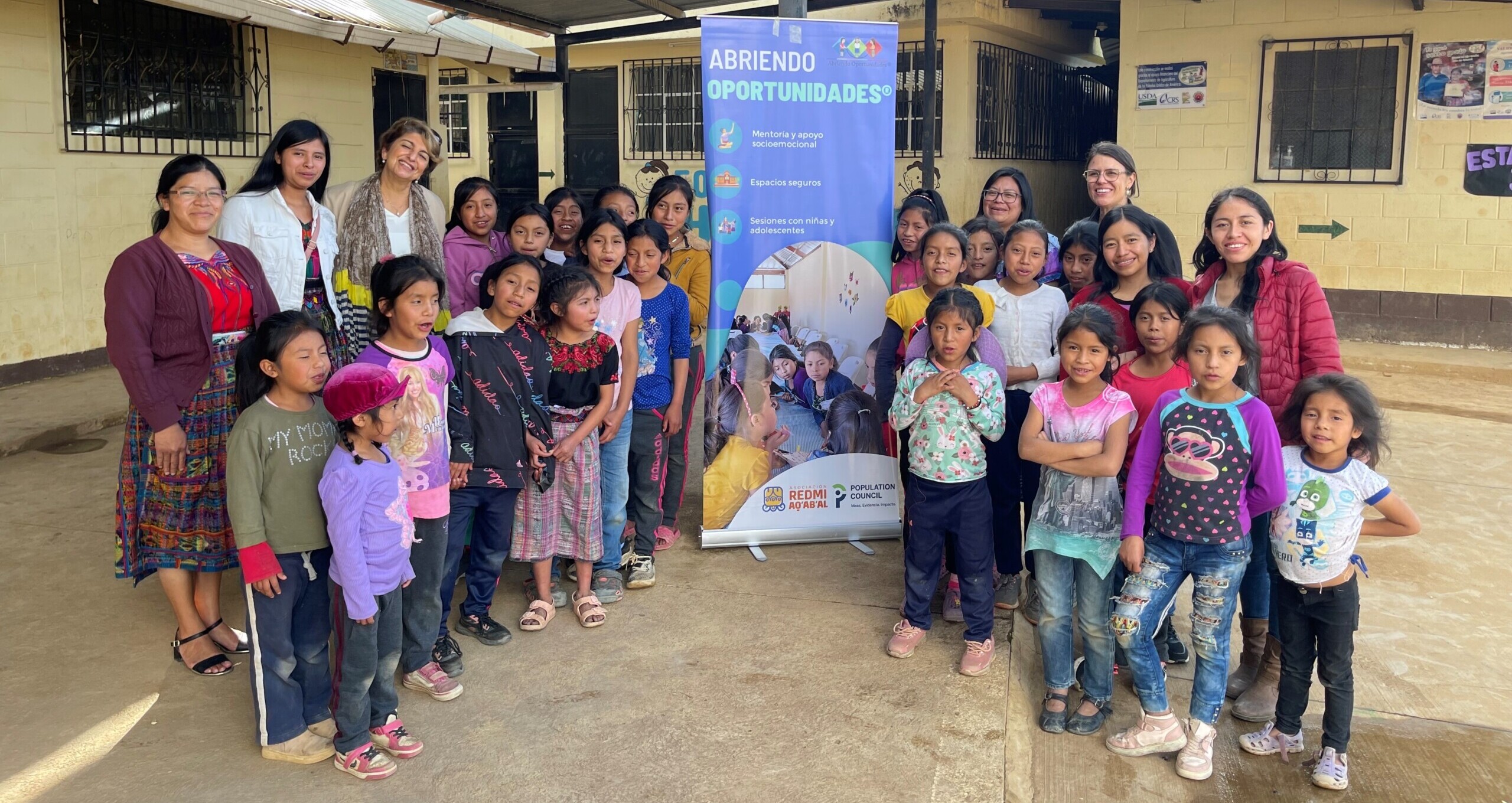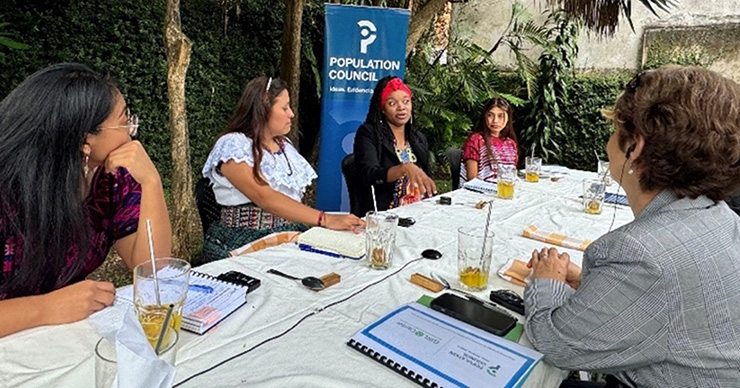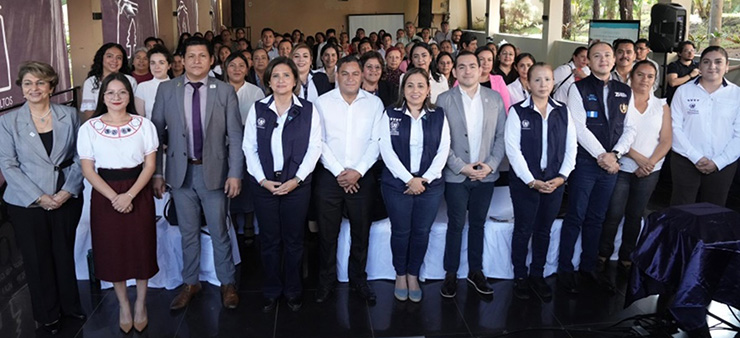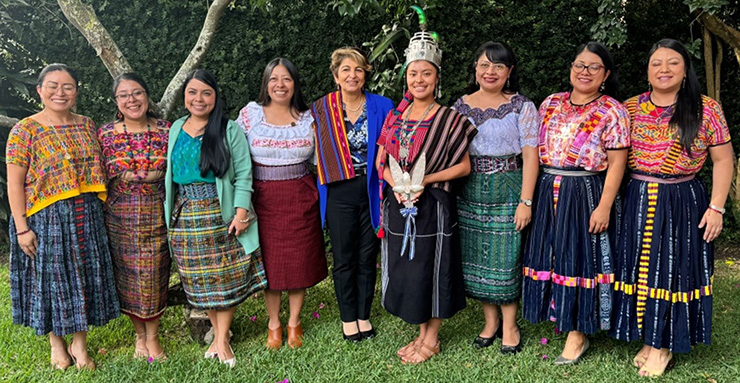
The Population Council’s Guatemala office is committed to policy impact, which is visible in its collaboration with government of Guatemala (GoG) agencies, and the ongoing, transformative work in partnership with Indigenous women leaders. By supporting the Abriendo Oportunidades® and the Escuela de Oportunidades programs, addressing gender-based violence and education gaps, advocating for Indigenous midwifery, and collaborating with Indigenous women leaders, the Council is committed to creating a sustainable platform for girls’ and women’s empowerment.
Abriendo Oportunidades® and Escuela de Oportunidades
Launched in 2004, Abriendo Oportunidades® (Opening Opportunities, AO®) is a gender transformative program designed to equip Indigenous girls and young women with supports to thrive in Guatemala’s post-war society. AO®’s methodologies and educational models are based in a decolonization approach—which is notable in a country where 47 percent of the population is Indigenous and disproportionately impacted by the inequities that come with socioeconomic exclusion. This means there are significant challenges for Indigenous populations to access essential health and education services. However, since the inception of AO®, the program has reached more than 25,000 Indigenous girls and adolescents across 500+ rural Guatemala communities by expanding their social support networks, connecting them with role models and mentors, building critical life and leadership skills, and providing hands-on professional training and experience.
In November 2024, the Council’s newly appointed President, Dr. Rana Hajjeh, visited the Guatemala office to learn more about the impact of AO®. In the Indigenous highlands of Momostenango, she visited community-based clubs for adolescent girls and saw AO®’s program mentors in action, corroborating the effectiveness of this model in preventing sexual and reproductive violence.
“The girls’ curiosity, eagerness, and enthusiasm about learning—despite the economic barriers they face to make it a safe space—was inspiring,” Dr. Hajjeh said.
The success of AO® led to a spin-off program in 2021, Escuela de Oportunidades, a platform co-designed with the Vice President of Guatemala and supported by the Council’s Girl Innovation, Research, and Learning (GIRL) Center. Professional, university-educated Indigenous women are placed in comprehensive public service training programs and internships in government offices. Interns are considered policy advisors due to their extensive community knowledge, which is highly valued by the Council—and has been historically neglected by GoG.
Dr. Hajjeh chatted with four policy advisory interns during her visit to learn more about their experiences and how they overcame Guatemala’s barriers for education. One intern described fleeing her hometown to avoid being married off at a young age by her mother as well as studying in Cuba on a scholarship. Another intern shared her experience of using safe, regular, and circular migration pathways to travel to the United States to work in agriculture and complete her education. Today, she is working alongside Congresswoman Sonia Gutiérrez Raguay, the only Indigenous woman representative in Congress.

Four policy advisory interns sit down to lunch with Dr. Rana Hajjeh.
Tackling Gender-Based Violence
The AO® program has gradually evolved into a social movement led by Indigenous women across generations and has expanded into Mesoamerica. AO® is a living example of the Council’s leadership in Guatemala and Mesoamerica and has continuously demonstrated its impact in reducing girls’ exposure to gender-based violence—as demonstrated by an impact evaluation funded by the Inter-American Development Bank in 2018.
On November 12, 2024, the Vice President of Guatemala, Dr. Karin Herrera, the Secretariat Against Sexual Violence, Exploitation, and Trafficking in Persons (SVET), and the Population Council co-hosted “Contexts of Sexual Violence among the Xinka.” This event highlights the deepening collaboration and positive relationships with high GoG offices to influence policy changes that remedy long-overdue historical debts to Indigenous populations in Guatemala. These populations are in pursuit of lives that are free of sexual violence and are bolstered by dignified educational and life paths. In attendance were Dr. Hajjeh, along with local political leaders, Dr. Herrera, public representatives from SVET, and the General Director of the National Youth Council, Mina’wee’ López González—a former intern in the first cohort of Escuela de Oportunidades. Council intern Dámaris Lemus presented the results of a community assessment of the perceptions of sexual violence among the Indigenous Xinka community, and recommended policies to better serve this population.

“Contexts of Sexual Violence among the Xinka” event co-hosted with SVET and participation from two policy advisory interns.
Commitment to Education
Due to insufficient infrastructure and economic access, only 30 to 40 percent of secondary school students in Guatemala continue their studies. Over the past 10 years, the Council’s Guatemala office has been building a network of donors—including the Tinker Foundation, the Ward Foundation, the Luis von Ahn Foundation, and the Summit Foundation—to further its research in effective education models to close gender gaps.
Since early 2024, a consortium between civil societies, the Council, the Ministry of Education, and the Ministry of Labor has worked to close gaps in secondary education access and stimulate post-secondary job acquisition to mitigate economically motivated migration. After meeting with the network, Dr. Hajjeh redoubled the Council’s commitment to educational access in Guatemala. The goal is to deploy the Council’s successful initiatives for Indigenous peoples in other Latin American countries facing similar obstacles.
The Importance of Indigenous Midwifery
In the city of Chimaltenango, the midwives of Nim Alaxik, Movimiento Nacional de Abuelas Comadronas (National Grandmother Midwives Movement), have just completed a political advocacy certification course. The Council has supported the consolidation of Nim Alaxik as a grassroots movement and collaborates on advocacy engagement with the Ministry of Health to demand the inclusion of Indigenous midwives in the national health system through a dignified role.
Dr. Hajjeh talked with the midwives about the ongoing fight against the erasure and discrimination of Indigenous health practices and praised their pursuit of justice within an unjust system. She met with Nim Alaxik’s national coordinator, Magdalena Cholotío, who discussed with Population Council Guatemala’s Country Representative, Ángel del Valle the importance of scaling midwifery advocacy to the executive branch through the Council’s relationship with the GoG—seeking complementary collaboration to the efforts pursued by Congresswoman Sonia Gutiérrez. This is one of many examples of Population Council Guatemala’s role as a GoG-civil society liaison, sowing seeds of change in government systems. This work is grounded in decades of experience and understanding of Indigenous communities.
The Power of Indigenous Women
Dr. Hajjeh also met many prominent Indigenous women in government, arts, civil society organizations, and nongovernmental organizations—all of whom maintain a close relationship with the Council as allies and supporters, including: Ms. Griselda González, Senior US Agency for International Development Advisor and former Private Secretary to the Vice President; and the Vice Minister of Labor, Ms. Claudia Peneleu. They reiterated their deep appreciation for the Council’s role in offering not only technical support and research, but also solidarity and guidance for these Indigenous women’s endeavors.
“Population Council Guatemala has created an ecosystem that is serving as a platform for girls’ and women’s empowerment, that is sustainable and visible,” says Dr. Rana Hajjeh. She added that she looks forward to continued partnerships with GoG to elevate Indigenous voices.

Dr. Rana Hajjeh with Council allies and supporters (all Indigenous women leaders).
